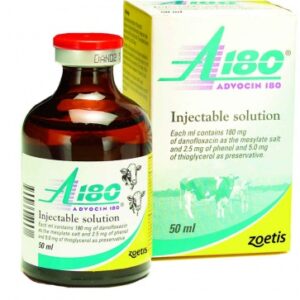Description
AMIGLYDE-V law restricts this drug to use by or on the order of a licensed veterinarian.
FAMIGLYDE-V or the treatment of uterine infections (endometritis, metritis and pyometra) in mares, when caused by susceptible organisms including Escherichia coli, Pseudomonas sp and Klebsiella sp.
The use of AMIGLYDE-V in eliminating infections caused by the above organisms has been shown clinically to improve fertility in infected mares.
While nearly all strains of Escherichia coli, Pseudomonas sp and Klebsiella sp, including those that are resistant to gentamicin, kanamycin or other aminoglycosides, are susceptible to amikacin at levels achieved following treatment, it is recommended that the invading organism be cultured and its susceptibility demonstrated as a guide to therapy.
Amikacin susceptibility discs, 30 mcg, should be used for determining in vitro susceptibility.
AND DOSAGE
For treatment of uterine infections in mares, 2 grams (8 mL) of AMIGLYDE-V, mixed with 200 mL 0.9% Sodium chloride injection, USP and aseptically infused into the uterus daily for three consecutive days, has been found to be the most efficacious dosage. Consult your veterinarian.
For the treatment of uterine infections (endometritis, metritis and pyometra) in mares, when caused by susceptible organisms including Escherichia coli, Pseudomonas sp and Klebsiella sp.
The use of AMIGLYDE-V in eliminating infections caused by the above organisms has been shown clinically to improve fertility in infected mares
While nearly all strains of Escherichia coli, Pseudomonas sp and Klebsiella sp, including those that are resistant to gentamicin, kanamycin or other aminoglycosides, are susceptible to amikacin at levels achieved following treatment, it is recommended that the invading organism be cultured and its susceptibility demonstrated as a guide to therapy.
Amikacin susceptibility discs, 30 mcg, should be used for determining in vitro susceptibility.
AND DOSAGE
FAMIGLYDE-V or the treatment of uterine infections (endometritis, metritis and pyometra) in mares, when caused by susceptible organisms including Escherichia coli, Pseudomonas sp and Klebsiella sp.





Reviews
There are no reviews yet.